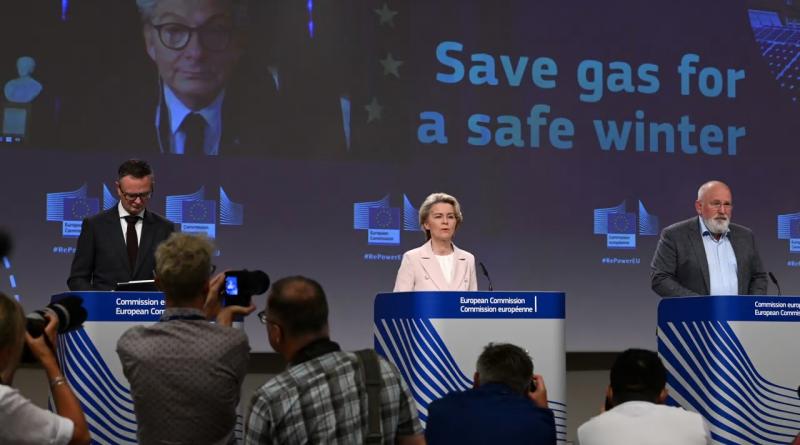The gas buyers’ club: EU plots price-cutting cartel

Sky-high prices are driving EU countries to pool their buying power. Is it the start of something bigger?
In 1960, a group of energy-rich but otherwise relatively poor countries ran out of patience with being ripped off by wealthier nations and decided to shake things up. Overturning the global order, they banded together to form OPEC, the oil producers’ cartel that today holds huge sway over the price of fuel worldwide.
More than 60 years later, the European Union plans to take its first steps in the opposite direction. EU leaders meeting in Brussels are working up plans to become a buyers’ cartel for natural gas.
The radical step comes in response to sky high prices that are driving inflation, punishing consumers and businesses, and hurting the European economy. Brussels has drawn up plans for emergency gas rationing if supplies are squeezed during the colder weather this winter.
At a time of fraught political relationships, with the historic alliance between France and Germany feeling the strain, there are doubts over whether the sweeping reforms to EU energy can prove viable in the long run.
But if leaders can agree, how would such a scheme operate? And what would such a buyers' cartel — determining the price the EU is willing to pay — mean for European principles of competition and open markets?
Under proposals put forward by the European Commission, EU countries and their respective gas companies would be legally required to use a centralized buying platform to try to secure at least 15 percent of the natural gas they need to fill their stores in 2023.
With multiple warnings about the tightness of global gas supply next year and a likely continuation of Russia’s squeeze on exports to Europe, success is critical to the bloc's ability to weather the energy crisis and protect its citizens in the long-run.
The proposal represents another major step away from the EU energy orthodoxy of the past. In 2014, when Russia annexed Crimea, former Polish Prime Minister Donald Tusk imagined a new energy union that would include a "single European body charged with buying its gas." He saw it as a key means by which the EU could stand up to Russia’s energy blackmail.
Amid skepticism from free market advocates in Germany and pre-Brexit U.K., that idea didn’t survive more than a year. But today, in an increasingly hostile geopolitical energy environment, anything seems possible.
“Tusk was ahead of his time and absolutely right,” said Dieter Helm, professor of economic policy at New College, Oxford and a former energy adviser to both the Commission and the Polish government under Tusk. “Europeans will try every other alternative but, in the end, they will realize that this bargaining power is the way to get themselves out of a hole and in their long-term interest. A European buyers’ cartel for gas is an extremely sensible thing to do.”
New energy orthodoxy
The Commission’s joint purchasing proposals are a cornerstone of a wider plan to tame gas prices in Europe.
While EU leaders have clashed over the wisdom or otherwise of some form of gas price cap, there is “broad support” now around the idea of joint purchasing, European Commission President Ursula von der Leyen said on Tuesday. That may prove optimistic. Hungarian Prime Minister Viktor Orbán tweeted ahead of the summit that the plan reminded him of EU's "slow and expensive" joint vaccine procurement. "I expect a huge debate," he predicted.
Referring to the EU’s overall approach to the gas market, von der Leyen said it was time the EU put out a “clear signal that we are willing to be reliable partners on the market — but not to any price anymore.”
That level of interventionist rhetoric was unthinkable in Tusk’s day.
“There was a whole liberalization, competition, privatization agenda which the EU pursued,” said Helm, “and that meant getting government out of energy policy; the market would look after security. This was the time when there was lots of plentiful gas and of course prices were falling.” Now, he said, “the tide of history is going in the direction of more state intervention and control."
Arturo Varvelli, senior policy fellow at the European Council on Foreign Relations, said that in a hostile world, the EU could do worse than turn itself into a reverse OPEC for gas. “This is potentially the birth of a mechanism or a unitary policy that has multiple benefits in the coming years,” he said over email. Joint action could be a good idea beyond gas purchases, too, in areas such as infrastructure investment and energy policy choices, Varvelli said.
Skepticism remains
There remains some skepticism among EU diplomats.
According to the Commission, the mandatory element of the scheme covers 13.5 billion cubic meters of EU gas demand, equivalent to the annual gas use of Greece, Bulgaria, Croatia and Slovenia combined.
In other words, a lot of gas — but not all the gas the bloc needs. Draft proposals, meanwhile, set how the scheme might work in practice and include a significant caveat, under which gas companies would not be obliged to actually purchase the gas at prices negotiated via the EU scheme.
It also foresees the use of an “IT tool,” run by an external “service provider” via which gas companies across the EU would submit their gas needs. “What will it look like? Will it be a big Slack channel with all these companies?” one diplomat asked.
A voluntary joint purchasing plan via the so-called EU Energy Platform was already set out earlier this year, but has suffered multiple pitfalls and minimal uptake.
Commission officials are inevitably wary of comparisons with OPEC. “The EU is looking to use its collective economic weight to deliver the best possible outcome for its citizens and businesses in this difficult moment on global energy markets,” said one, comparing the approach to the bloc’s efforts to jointly secure vaccines. Any regulation would respect EU competition law, the official added.
The diplomat quoted above put it more succinctly, when asked if the new proposal was a step towards the EU becoming a reverse OPEC for gas. “Inshallah,” they said.
coverphoto: Under proposals by the European Commission, EU countries would be legally required to use a centralized buying platform to try to secure at least 15 percent of the natural gas they need to fill their stores in 2023 | John Thys/AFP via Getty Images




